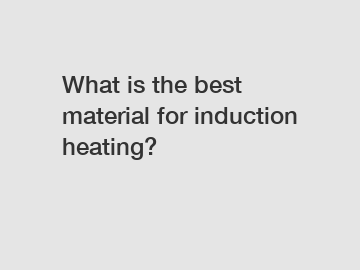What is the best material for induction heating?
What is the Best Material for Induction Heating?
Induction heating is a popular method widely used in various industries for its efficiency and precision. It involves the use of alternating magnetic fields to heat electrically conductive materials quickly and accurately. However, to achieve optimal results, it is essential to choose the right material for induction heating. In this article, we will explore the best materials for induction heating and their key characteristics.
1. Ferromagnetic Materials.

Ferromagnetic materials are the most commonly used materials for induction heating. These materials include iron, nickel, cobalt, and their alloys. They possess strong magnetic properties, which makes them highly responsive to alternating magnetic fields. Ferromagnetic materials have a high Curie temperature, which refers to the temperature at which they lose their magnetic properties. This characteristic allows them to be heated quickly and efficiently using induction heating.
2. Non-ferromagnetic Materials.
Non-ferromagnetic materials, such as stainless steel, aluminum, graphite, and titanium, are also frequently used for induction heating. These materials have low magnetic permeability, meaning they do not respond as strongly to magnetic fields compared to ferromagnetic materials. However, they still conduct electricity and can be heated effectively through induction. Non-ferromagnetic materials are commonly used when specific thermal conductivity or corrosion resistance is required.
3. Magnetic Shielding Materials.
When it comes to induction heating systems, it is often necessary to protect certain components from the effects of magnetic fields. Magnetic shielding materials, such as Mu-metal and various alloys, are used to redirect or absorb magnetic flux, preventing it from interfering with sensitive equipment. These materials have high magnetic permeability and are excellent at reducing the magnetic field's intensity within an enclosed space.
4. Composite and Coating Materials.
Induction heating can also be applied to composite materials, where different layers or substances are joined together. By choosing the right combination of materials, manufacturers can create superior induction heating elements. Additionally, certain coatings on a base material can improve its performance during induction heating. For example, ceramic coatings can enhance wear resistance, while thermal barrier coatings can minimize heat loss during the process.
Conclusion.
In conclusion, various materials can be used for induction heating, each with unique characteristics and applications. Ferromagnetic materials like iron and its alloys are commonly used due to their strong magnetic response, high Curie temperature, and efficient heating capabilities. Non-ferromagnetic materials, such as stainless steel and aluminum, are preferred when specific properties like thermal conductivity or corrosion resistance are required. Magnetic shielding materials like Mu-metal ensure the protection of sensitive components from magnetic interference, and composite or coated materials can further enhance induction heating properties.
Determining the best material for your specific induction heating application requires consideration of factors such as the desired heating rate, operating temperature, magnetic permeability, and cost. Consulting with experts in the field can help you make an informed decision. If you have any further questions or require assistance, please do not hesitate to contact us.
[ADD YOUR CONTACT INFORMATION HERE].
For more straight seam steel pipe welder, welder exporter, high frequency weldersinformation, please contact us. We will provide professional answers.


